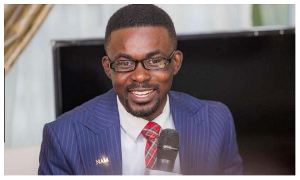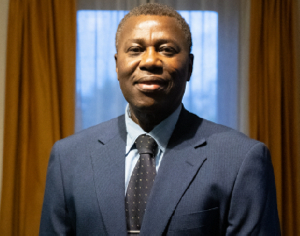A reckless statement by Ghanaian actor, Prince David Osei, about purported racial abuse of Africans in China which has been widely reported in the Ghanaian media must be seriously condemned to avoid a diplomatic row with the government of the People's Republic of China.
The actor, via his official Twitter handle on April 13, 2020, claimed Ghanaians were being ill-treated in China and called for a rerun of tests on medical supplies donated by the Chinese billionaire, Jack Ma, because, according to him, "Chinese people can never be trusted."
I'm pretty curious on this one: Which nation's people does David Osei trust?
On April 9, 2020, someone forwarded 5 videos to me via WhatsApp which he claimed to have received from a relative who is a student in China. After watching the videos, I noticed I had seen some of them a few hours earlier on a different platform on Facebook where the source claimed Africans in China were under attack by Chinese authorities under the pretext of COVID-19 coronavirus testing. I immediately called back to inquire why he sent them to me.
Having engaged me previously for a PR gig, he told me he had information this time round that Chinese authorities were harassing Africans, so he wanted me to write about it for the world to see.
I told him I couldn't immediately confirm harassment in the video and requested from him to give me the phone number of the source of the videos which he still hasn't sent after 5 days.
My interest in the matter grew even stronger after I kept seeing angry posts on social media — Ghanaians claiming Chinese government was racially abusing Africans, so I contacted some other Ghanaian friends who are living in China including one close pal who is currently studying in a Chinese University. I wanted to get a clearer understanding of the situation.
From what I gathered, the issue is basically an immigration issue for most of the Africans claiming to be under racist attack by the Chinese authorities who are simply doing their job — fighting coronavirus.
Unfortunately for some African residents, they have been caught up in the wahala which demands that they undergo mandatory testing and observe all the health protocols which have been successfully implemented throughout China to curb the spread of the virus since it was first identified in parts of the country in late 2019.
As Western countries deal with the wrath of the pandemic, China's successes in combating the disease within its borders is no fluke, being the first epicentre of the disease which killed over 3,000 people leading to several weeks of lockdown across the country with the second-largest economy in the world.
Chinese authorities have embarked on thorough house-to-house testing of residents which has alarmed some Africans who are living in the Guangdong Province with expired or fake residence permits.
The situation is fundamentally a health issue for the Chinese government and an immigration issue on the part of some Africans in the international business hub of Guangzhou, who know that any form of scrutiny into their residence documents might land them in trouble, probably the attempt to link the exercise to racism for the immediate attention of the outside world to mount pressure on the Chinese government to ease processes.
China has no permanent stay for non-Chinese nationals living on its soil, thus foreigners (from all other nations) are required by law to submit their travel documents for renewal every 12 months or face arrest, detention and subsequent deportation.
It is no secret that unlike other foreign nationals, though the majority of Africans in China ply their trade-in Guangzhou, there is a sizeable percentage of them who have problems with the Chinese immigration on the same issue of residence permits and are thus living without the required legal documents in the world's most populous nation.
Unfortunately, China's resolve to stop the spread of coronavirus through mandatory testing and quarantine of foreigners and recent travelers has reignited the age-old confusion in Guangzhou of Africans playing hide and seek with Chinese law enforcement which was highlighted in the CGTN investigative documentary, Africans in Guangzhou Episode 1.
Due to the novelty of the virus, certain overly-protective measures and their resultant backlash are to be expected in these times as various communities work to protect their populations. President Nana Addo Dankwa Akufo-Addo Akufo-Addo's remark, "these are not normal times" couldn't have been more apt.
Ghanaian citizens have been captured in videos complaining bitterly about ill-treatment and humiliation at the hands of local authorities as they were picked up and sent to isolation centres upon their arrival at Kotoka International Airport in Accra without 'proper briefing'.
A man in a rural community in the Western Region was nearly lynched for welcoming visitors from Accra just a day after President Akufo-Addo's first announcement of a partial lockdown in the country. The man was saved by the Chief Executive of the municipality who paid and arranged for the visitors to be sent back to Accra.
While a group of Ga traditionalists clashed with a police patrol team over lockdown violations on April 10, 2020, the people of Effutu and Prampram have strongly resisted government's plans to use public facilities in their communities as COVID-19 quarantine centres.
I have had my own share too. A few days before the lockdown was announced, I shared a picture I took with a Chinese engineer during a media tour on health and safety practices at one of the biggest Chinese-owned factories in Accra.
Going by comments made by some of my fellow Ghanaians under the photo which I shared on Facebook, I am "dead meat."
I became so embarrassed that I altered the privacy settings on my post to ensure that he (the Chinese man) will have close to zero chance of ever seeing the picture under which he had been described by my African friends as the coronavirus itself just because of his nationality.
In March 2020, a video emerged showing Ghanaians getting out from a commercial van as soon a Chinese person entered. The Twi language narration of the event produced a major meme which gained the video widespread popularity in Ghana gaining a lot of likes, shares and laughter. Nobody condemned such disgraceful behaviour. Imagine if it had been the other way round.
However, on April 11, 2020, Ghana's Minister for Foreign Affairs and Regional Integration, Shirley Ayorkor Botchway, issued a statement expressing disgust about the 'China videos'.
While I applaud the swift responses from African governments to the purported racism in China, I also find the statement issued by the Foreign Affairs Ministry of Ghana unfortunate, premature and libelous.
Just as the actor, the minister must be blamed for the unnecessary anti-China sentiments being expressed by the Ghanaian public which have been further reinforced by the Ministry's description of the matter as "Chinese discrimination against Africans" without providing any evidence to back it.
Diplomacy works better when biases are relaxed and serious efforts made to establish facts before conclusions are made — all out of respect for other nations.
I urge African leaders to acknowledge the efforts being made in other jurisdictions as they marshal their finest resources toward the eradication of COVID-19 to safeguard the lives of their citizens. That is what Africa must do.
The author is founder of New Media Centre (Ghana)
Email: lordkwekusekyi@gmail.com
Opinions of Tuesday, 14 April 2020
Columnist: Lord Kweku Sekyi















